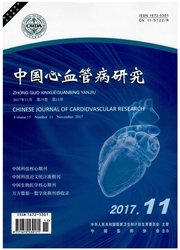

 中文摘要:
中文摘要:
目的观察抗β1肾上腺素受体细胞外第二环(β1-AR—EcⅡ)自身抗体长期存在对大鼠心肌细胞胞内游离钙水平的影响。方法分别将抗β1-AR—EC。抗体阴性和阳性大鼠血清中的IgG通过鼠尾静脉注入正常大鼠体内,建立对照及被动免疫模型。用ELISA方法定期监测血清中抗β1-AR—ECⅡ抗体水平;在免疫末期用BL-410生物信号记录分析系统测定大鼠在体心功能的变化;用激光共聚焦显微镜观察大鼠心肌细胞胞内游离钙水平。结果在免疫第40周时与对照组相比,免疫组±dp/dmax下降[(311.0±20.3)kPa/s比(465.0±24.0)kPa/s,P〈0.01],-dp/dt-下降[(-285.0±21.0)kPa/s比(-395.0±23.0)kPa/s,P〈0.01];LVDP升高[(6.44±0.36)kPa比(0.50±0.16)kPa,P〈0.01];心室肌细胞胞内游离钙水平显著升高(503.30±35.22比52.88±1.12,P〈0.01)。结论抗β1-AR-ECⅡ自身抗体长期存在可使大鼠心室肌细胞胞内游离钙水平升高发生钙超载,可能引起心脏功能的改变。
 英文摘要:
英文摘要:
Objective To observe whether intracellular calcium levels can be affected by long-term existence of the autoantibodies against the second extraceltular loop of β1 adrenoceptor (anti-β1-AR-EC Ⅱ ) in rats ventricular myocardial cells. Methods The sera from anti-β1-AR-EC F-positive rats were intravenously transferred to healthy rats to establish passive immunized model; ELISA was used to detect the level of anti-β1AR-EC in sera regularly. The cardiac function was examined in vivo by BL--410 Biological Functional System in the final phase of immunizing. The changes of intercellular free calcium level in rat cardiac myocytes were observed using confocal microscopy. Results At the end stage of passive immunization, ±dp/dtmax decreased[ (311.0±20.3)kPa/s vs Negative IgG group (465.0±24.0)kPa/s, P〈0.01 ], -dp/dtmax decreased [(-285.0±21.0)kPa/s vs Negative IgG group (-395.0±23.0)kPa/s, P〈0.01 ], LVDP increased [(6A4±0.36)kPa vs Negative IgG group (0.50±0.16)kPa, P〈 0.01 ]. Intracellular free calcium in ventricular myocytes was significantly higher (503.30±35.22 vs Negative IgG group 52.88±1.12, P〈0.01). Conclusion Long-term existance of anti-β1-AR-ECn can result in the increase of intraeellular free calcium in rats ventricular myocytes and may induce the changes of cardiac function.
 同期刊论文项目
同期刊论文项目
 同项目期刊论文
同项目期刊论文
 期刊信息
期刊信息
